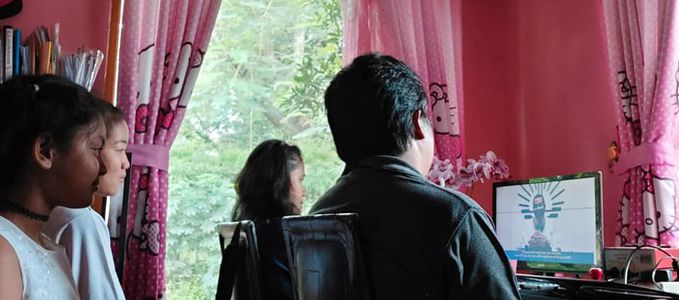
A congregation without walls and borders—this is how hundreds of thousands of New Apostolic families experienced the past Sunday. Even though the doors to our churches were locked, the Church itself was more open than ever before.
Restricted access, bans on assemblies, lockdowns: in the past two weeks, activity in our church buildings has ground to a halt on account of the corona crisis in one country after another. But congregational life is far from dead. In times of distress the word of God comes into our homes via the Internet.
This applies above all to divine services. What Canada and the United States have been doing for a long time, was practised by the District Church Western Germany for the first time in mid March. The other European districts followed suit a week later and broadcast live streams of divine services. Then government guidelines were issued in South-East Asia, South America, and the West Pacific—and the Church followed suit.
All the brothers and sisters had to do now was find their virtual congregation. Websites such as nac.today provided the necessary information. Facebook lists circulated. And a video clip on YouTube, providing information on the various available offers, was viewed more than 70,000 times. Those who do not have Internet were given a telephone number to call to be able participate in the respective broadcast.
Uplifting and encouraging
A total of 18 central divine services—by live stream or on demand, some in several languages—were counted in the New Apostolic Church on this weekend, 21 and 22 March, across the globe. The Bible texts imparted upliftment and encouragement. “Fear not, for I am with you,” was read in the Netherlands. “Your word was to me the joy and rejoicing of my heart,” was used in Southern Germany. And the divine service in the USA was based on the following: “This is the day the Lord has made; we will rejoice and be glad in it.”
It was mostly the District Apostles themselves who conducted the divine service such as District Apostle Michael Ehrich (Southern Germany), Leonard Kolb (USA), Rüdiger Krause (Northern and Eastern Germany), Wolfgang Nadolny (Berlin-Brandenburg, Germany), and Tshitshi Tshisekedi (Democratic Republic of the Congo South-East). In other places, Apostles stepped behind the altar, for example, Reinaldo Milczuk and Herman Ernst in South America, Peter Klene in the Netherlands, John Sobottka in Canada, and Samuel Tansahtikno in South-East Asia.
Divine services in shifts
The District Church Western Pacific had to provide four different live streams. The district not only spans an above-average number of time zones, but also the International Date Line in the Pacific.
The Church in Southern Africa offered more divine services than usual on a Sunday. The government there had limited gatherings to a hundred people. Thus the ministers were deployed in shifts. Depending on the size of the congregation, services were held on Saturday and Sunday. Meanwhile, the Church’s own television channel, NACTV, aired an already planned service for the French-speaking regions of the New Apostolic Church Southern Africa with District Apostle John Kriel and an interpreter.
Going from house to house
However, the region where the most ministers were out and about was the District Apostle Area Democratic Republic of the Congo South-East. No more than twenty people were permitted to gather there.
Most of the 1.8 million members did not have the possibility to follow the central divine service on YouTube. For this reason, the ministers, from Priest to District Apostle, visited the families at home and celebrated Holy Communion with them.
Radio and TV network show interest
The live stream of the divine service in the district of Western Germany captured the interest of WDR, the regional television network. Right after the divine service the radio station WDR 2 interviewed the officiant, Apostle Stefan Pöschel. And a day later WDR TV broadcast its own report.
And it was in this divine service that Priest Felix Frobel said, when called to assist, “It felt like a Church without borders or walls.”
















